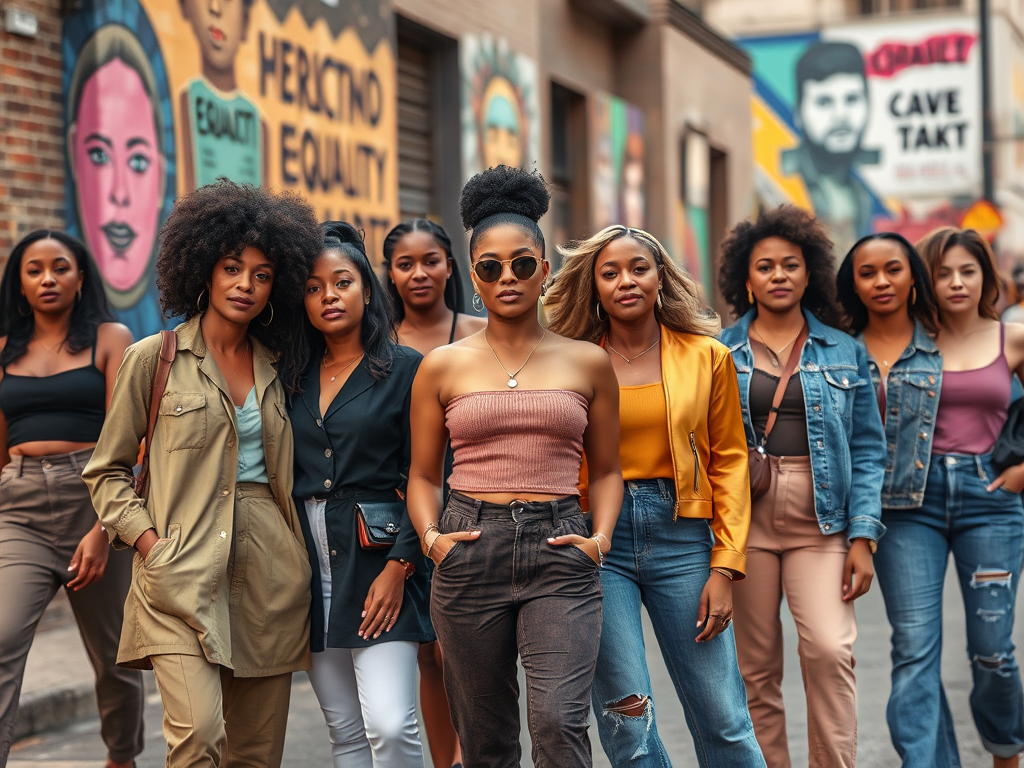The rise of feminist brands in the fashion industry is a remarkable phenomenon that highlights the changing dynamics of consumer power and social responsibility. As shoppers become more conscious of the impact of their purchases, brands that prioritize purpose over profit are gaining traction. Fashion, historically associated with superficiality, is being redefined by companies that champion causes like gender equality, body positivity, and sustainable practices. This evolution is not merely a trend; it represents a significant shift in how consumers relate to the brands they support. As we explore the realm of feminist brands, we unveil a tapestry of values and missions that challenge the status quo and inspire change in society. Join us on this journey as we delve into the heart of a fashion movement grounded in purpose and empowerment.
The essence of a feminist brand extends beyond surface-level aesthetics. Brands that are genuinely committed to feminist ideologies create a narrative that resonates with their audience, shaping their identities and influencing their lifestyle choices. Through an unwavering commitment to core values, these brands stand out in a crowded marketplace, carving out a niche that attracts like-minded consumers. It’s essential to understand that the principles driving these brands can vary widely, yet they often share foundational beliefs in equality and ethical practices. Below, we detail what defines a feminist brand and how it differs from traditional counterparts.
What Defines a Feminist Brand?

At its core, a feminist brand is one that embraces the principles of feminism, advocating for equality across all genders. This commitment manifests in various ways such as inclusive sizing, ethical production methods, and transparent lab practices. Furthermore, feminist brands often engage with social issues through their branding and marketing campaigns, taking a stand on topics that matter to their consumers. This contrasts sharply with many traditional fashion brands that primarily prioritize profit margins and aesthetic appeal without deeper social engagement.
- Body Positivity: Many feminist brands celebrate all body types, promoting a culture of self-love and acceptance.
- Ethical Labor Practices: These brands often source materials responsibly and ensure fair wages for workers.
- Community Engagement: Feminist brands tend to support local communities and activism, creating a positive social impact.
Notable Feminist Fashion Brands

In the expansive landscape of feminist fashion, several brands exemplify the integration of values and style. Below, we spotlight a selection of noteworthy feminist brands, illustrating their missions and distinctive characteristics.
| Brand Name | Core Values | Key Initiatives |
|---|---|---|
| Reformation | Equality, Body Positivity | Collaborations with women’s shelters |
| Patagonia | Sustainability, Fair Trade | Eco-friendly materials |
| Savage X Fenty | Inclusivity, Activism | Fashion shows supporting social issues |
These brands demonstrate a profound commitment to empowering individuals through fashion, manifesting a distinct narrative that resonates with today’s socially conscious consumer. Understanding what makes each of these brands unique allows us to appreciate the broader movement they represent. As you delve into the essence of feminist fashion, take note of the attributes that set these brands apart.
The Impact of Feminist Fashion on Society
The influence of feminist brands on societal norms cannot be understated. As these companies advocate for gender equality, they challenge the deeply ingrained stereotypes and biases often perpetuated by mainstream fashion. The strong message of empowerment that feminist brands convey is not only transformative for their customers but also serves as a call to action for the industry as a whole. Consumers are increasingly leaning towards brands that reflect their values, signifying a shift in shopping behaviors that prioritize ethics over mere aesthetics. In fact, many consumers now make it a point to support brands that resonate with their beliefs, leading to cultural changes that are both significant and lasting.
- Shifting Consumer Behavior: The increasing preference for ethical brands has influenced market trends, driving sales toward feminist options.
- Raising Awareness: Campaigns launched by feminist brands often ignite conversations around gender equality and body positivity.
- Community Support: Many of these brands contribute to local communities, fostering a supportive network for vulnerable populations.
The Role of Sustainability in Feminist Fashion
In today’s world, the concept of sustainability has become intertwined with feminist values, as an increasing number of brands recognize their responsibility towards the environment. Feminist brands are not merely focused on women’s rights; they also advocate for sustainable practices that consider the well-being of our planet. Many of these brands implement eco-friendly initiatives such as using recycled materials, minimizing waste, and ensuring that their supply chains adhere to sustainable practices.
The positive synergies between feminism and sustainability create a robust framework for brands that seek to lead by example. By prioritizing ethical production and environmental stewardship, these brands attract conscious consumers who seek to align their purchases with their values. Ultimately, integrating sustainability into feminist branding serves not just as a marketing tactic but as a moral imperative in today’s climate-conscious world.
Challenges Facing Feminist Brands
Despite their noble intentions, feminist brands face numerous challenges in the competitive landscape of fashion. One of the most significant obstacles is the tendency for larger, traditional brands to appropriate feminist imagery and messaging without a genuine commitment to the ideology behind it. This often leads to consumer skepticism and distrust, making it imperative for feminist brands to clearly communicate their values and authenticity.
Moreover, navigating the marketplace filled with superficial trends can dilute the feminist message. Brands must find innovative ways to remain relevant while staying true to their core values. Authenticity becomes paramount, as consumers can discern brands that are simply jumping on the bandwagon versus those that are sincerely invested in advocacy and change.
Below are a few strategies that feminist brands can adopt to stay authentic and relevant:
- Building Community: Engaging with customers through events and initiatives fosters a sense of belonging and loyalty.
- Transparency: Being open about their practices and challenges helps build trust with consumers.
- Continuous Education: Staying informed about social issues and evolving consumer interests is vital for maintaining relevance.
Conclusion
In conclusion, feminist brands are more than just a trend in the fashion industry; they represent a meaningful shift towards a more conscious form of shopping. With a focus on purpose, these brands are changing the narrative around fashion, promoting values that foster equality, sustainability, and community support. Consumers play a critical role in this movement, as their choices influence the trajectory of the industry. By supporting feminist brands, individuals contribute to a larger goal: a fashion world that prioritizes ethical practices and social empowerment. As we move forward, we encourage all consumers to evaluate the brands they support and choose those that resonate with values of purpose and empowerment.
Frequently Asked Questions
- What is a feminist brand? A feminist brand is a company that advocates for gender equality and embodies feminist values in its practices and marketing.
- How can I identify a feminist brand? Look for brands that openly support feminist movements, promote inclusive sizing, and have ethical labor practices.
- Are feminist brands only focused on women’s fashion? No, many feminist brands create gender-neutral or men’s clothing that supports gender equality and challenges traditional norms.
- Is supporting feminist brands important? Yes, supporting these brands helps to reinforce values of equality and sustainability within the fashion industry.
- Can ethical practices coexist with profitability in the fashion industry? Absolutely! Many feminist brands demonstrate that ethical practices can attract loyal customers and lead to long-term financial success.
